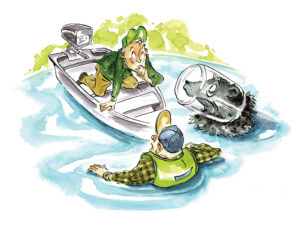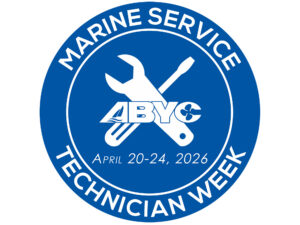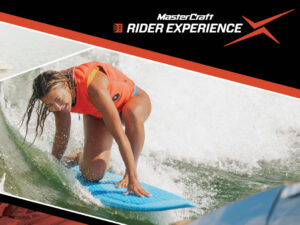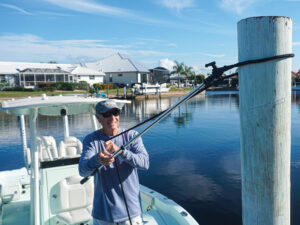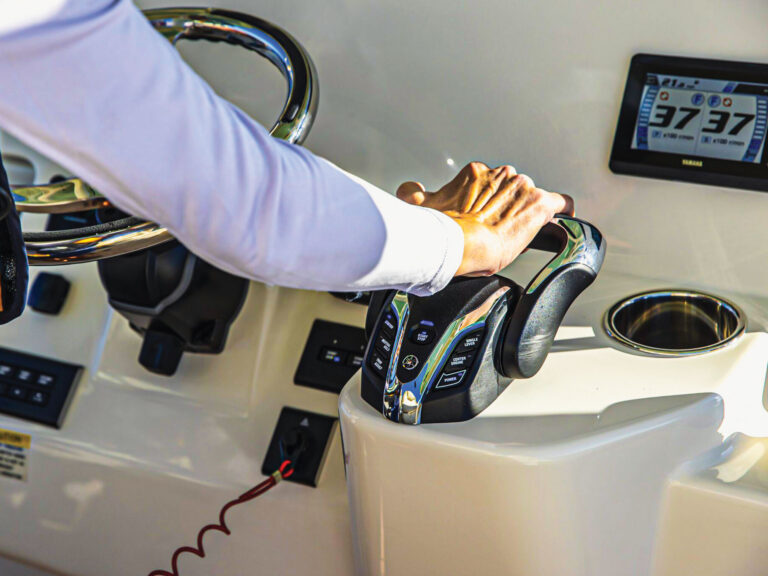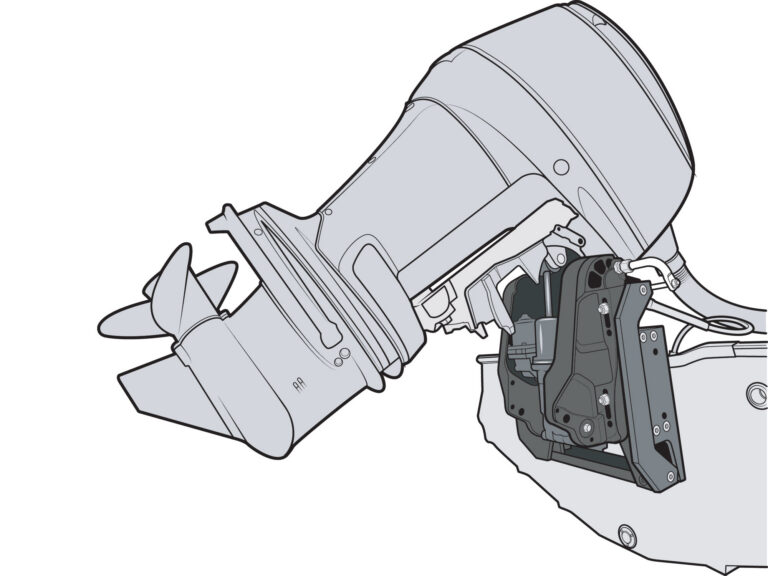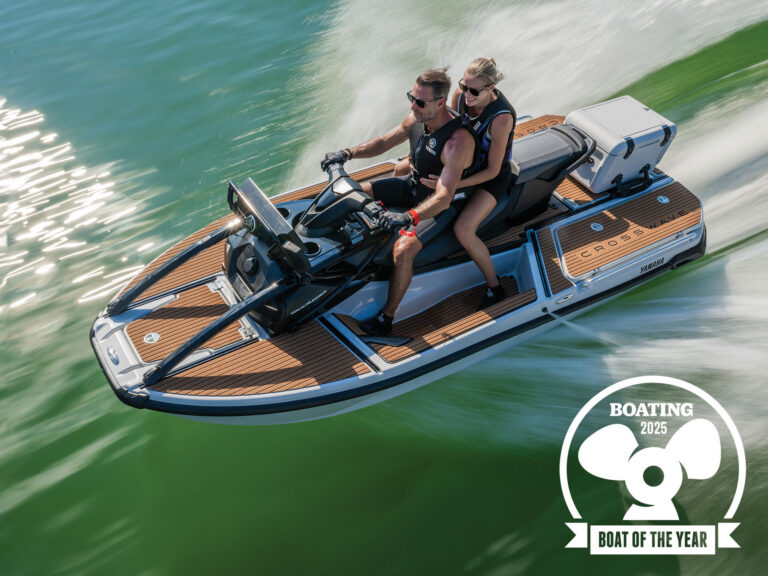
Overview
The Kevlar-reinforced fiberglass hull has a 23-degree deadrise, the sharpest in its class, designed to slice chop and angry seas while protecting the crew from impact. The fiberglass hardtop has an integrated three-panel tempered-glass windshield, and its structural support is built into the console for streamlined and sturdy good looks.
That’s just our first impression after stepping up at the dock, then taking it for a spin. We also noticed its sleek lines. The high bows of the early Robalos were gone in the new R250. They now kept plenty of stem height and bow sheer to shed oncoming seas, but not so much to disturb the forward view on acceleration. The hardtop was rakishly slanted, enhancing the performance look, and the colored side bands worked together to give the boat a sporty, stylish appeal.

Interior and Accessories
The helm seat was comfortably positioned for an uncrowded but safely snug position sitting or standing behind the wheel. Dual 12-inch Simrads not only gave us all the navigation and sonar data we needed, but all the engine-operating information was fed through them for display as well. And the dash was topped off with a Yamaha display below the portside Simrad.
Acceleration was lively getting on plane in under 4 seconds, and that’s impressive with two inline four-cylinder Yamahas pushing more than 25 feet of hull with a 9-foot-2-inch beam. Also impressive is its lateral stability at rest or trolling—thanks to that wide beam. It won’t pitch the crew around while idling in ocean seas.

That wide beam also gave a broad battleground for fish fighting and a deck that easily converted from fish to play. Fish with the transom seat tucked away, giving access to the large 30-gallon transom livewell, six shotgun rod holders in the transom, and two each on the gunwales. We had the optional leaning post with rigging station and cooler. With it, you sacrifice the four rod holders in the standard seats, but there are still four more in the hardtop. We’d choose the better helm seating. There are two more rod hangers under the starboard gunwale, and the coaming is padded with marine mat foam to protect the reels in rough water.

Anglers can boat their fish via the transom door or the portside boarding door—the latter being a pleasant surprise in a moderately sized and priced center-console. The stowaway side-door ladder is optional ($1,420), and it has a dandy dedicated storage rack under the transom hatch. Fish can be stowed in the floor lockers or in the bow lockers under the seats. Even with the seating cushions in place, forward seat hatches lift upward, allowing convenient access, and remain up until placed down, so fish can be slipped in without multiple hands.

For playtime, keep the forward seat cushions in place, making a large forward lounge with two forward-facing seats accommodated by removable backrests. An optional bow filler cushion turns the area into a sun pad. The bow area is surrounded by grab rails of thick, polished stainless steel for security and comfort. Plus, there is still another comfortable upholstered seat on the front of the console. It’s on heavy hinges to allow it to swing forward, opening a cozy head compartment for changing. It can also be equipped with a portable or, as was our tester, a flushing porcelain head. With ladders on the transom and dive door, you have a heck of a platform for diving, snorkeling, swimming, or just wading around the sandbar. A cockpit shower and raw-water washdown remove sand and salt from the swimmers or fish blood from the deck.
A simple lean bar with a cooler is available, but we liked the upgraded seat with rigging capabilities. You can add outriggers at the factory, and if you think you’ll want them, it’s better to have them installed by the builder.

Many boatbuilders offer 24- and 26-foot center-consoles, leaving Robalo’s 25 in the matador ring with premium-priced models from builders such as Grady-White and Boston Whaler. In spite of these brands’ higher price points—Whaler’s 250 Outrage center-console hits a base price $215,123, with comparable power and optional hardtop—Robalo has many comparable fishing and cruising features at a lower base with a standard hardtop. The question of value is deciding what’s worth it: a Ferrari F8 for $330,000 or a Corvette for $130,000? They’re both worth it, and they’re both going to get you a date to the prom. You’ll be a foot shorter in the Sailfish 242 ($163,802 base with dual 150s) and 2 inches narrower. Certainly there is plenty to support the higher-priced Whaler, but we found plenty aboard the Robalo to boost the ego and pride in ownership. So, apples to apples is hard to find. All that said, while there certainly are other 25-foot center-consoles out there, Robalo’s stands out in its field for good looks, value, long-lasting durability, good resale, and stellar brand reputation.
Read Next: Robalo R266 Cayman

How We Tested
- Engines: Dual Yamaha F200
- Props: Reliance 14 1/4″ x 17″ stainless steel
- Gear Ratio: 1.86:1 Fuel Load: 150 gal. Water on Board: 0 gal. Crew Weight: 450 lb.
High Points
- Standard hardtop has a special e-box above.
- The tempered-glass windscreens are more durable than acrylic windows.
- The 9-foot-2-inch beam generously adds deck space for fun, fishing and entertaining during cruising.
Low Points
- With dual screens, there’s a shortage of dash space for a VHF. Mitigate with an Icom command mic system with remote radio.
- The wraparound tempered-glass windshield is super in rain but confining in fair weather.
Pricing and Specs
| Price: | $146,585 (base with test power) |
| LOA: | 25’3″ |
| Beam: | 9’2″ |
| Draft (max): | 1’9″ (engines up) |
| Displacement (approx.): | 6,000 lb. |
| Transom Deadrise: | 23 degrees |
| Bridge Clearance: | 8’6″ |
| Fuel Capacity: | 165 gal. |
| Max Horsepower: | 400 |
| Available Power: | Yamaha outboards |
Speed, Efficiency, Operation

Robalo Boats – Nashville, Georgia; robalo.com

